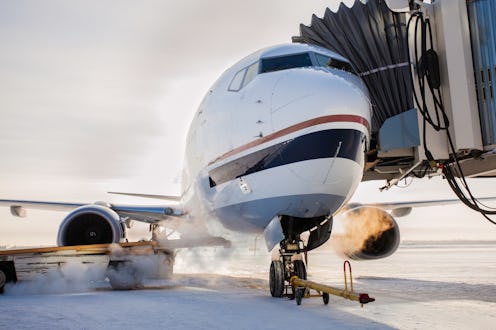Life
Flying Sucks For The Environment. But Are Carbon Offsets The Solution?

It's pretty clear at this point that air travel is not so great for the planet. If you travel a lot and are concerned about your environmental impact, you may have been tempted to purchase carbon offsets, where an airline makes a donation to environmental causes that fight greenhouse gases, to balance the pollution caused by your flight. However, it can sometimes be unclear when carbon-offset programs have the most impact, and whether you should buy them for every flight or focus on other ways of reducing pollution. Experts tell Bustle that there's an art to using carbon-offset programs. They also say that we need to look at carbon offsetting as part of leading greener lives in general, not just when we fly.
"Travelers need to fully understand that the most effective way to address climate change is to stop emitting," Dr. Susanne Becken Ph.D., professor of sustainable tourism at Griffin University, explains. When you buy a carbon offset, you're donating to an environmental organization that takes action to lower air pollution levels, like tree-planting, protecting the Amazon, or funding renewable energy. Many airlines now allow you to buy carbon offsets when you purchase your tickets for a few dollars. Carbon offsets don't affect how much carbon your flight actually produces, and Dr. Becken says it's important to make sure your carbon offset scheme is verified by Gold Standard. It also has limits. "Carbon offsetting is only a short-term measure," she says. "There is no absolute reduction [in pollution] when buying an offset." A carbon offset is meant to balance out the amount of emissions from your flight, but it doesn't make a dent in the world's emission levels overall.
When it comes to quick flights over short distances, experts tell Bustle, carbon-offsetting isn't the greenest option; the best choice is simply not flying at all. Dr. Graham Miller Ph.D., a professor of sustainability in business at the University of Surrey, tells Bustle that people looking to reduce their carbon footprint while traveling should be shifting away from short flights to more environmentally friendly transport, like trains, boats, or buses.
The carbon cost of long-haul travel is higher. The aviation sector contributes around 2% of the world's carbon emissions, according to the Air Travel Action Group, and long-haul flights (seven hours or longer) are a big part of that: a single long-haul flight can produce as much CO2 as one person does in a year. If you do need to travel long distances, Dr. Becken tells Bustle, you might want to buy two offsets: "one offset to compensate the emissions that actually happened as a result of the flight, and another one to enable real reductions elsewhere."
Carbon offset options also shouldn't do all the work. People traveling long distance, Dr. Miller says, can also make choices that make their flight as low in emissions as possible. "Fly the most direct route, choose airlines in accordance with the emissions of the flight, and don't fly business class," he says. Flying business class creates a much bigger carbon footprint than flying coach because it means less space for other passengers, making the plane less carbon-efficient, and because amenities for business class travelers, like huge seats and fancy linens, create more pollutants. Dr. Miller suggests picking airlines with low emissions records. It's still a pollution-heavy travel choice, but you can lower its impact with your flight selection.
Dr. Miller also suggests adopting a lower carbon footprint in general can affect your carbon offset choices. "An individual with low emissions by virtue of their diet, daily commute and consumption patterns has less to offset than a person who has a high overall emissions profile," he tells Bustle. That doesn't mean that a person with a plant-based diet who walks to work can fly short-haul a lot and still have a net positive effect on the environment. Instead, it means looking at your life and carbon footprint as one picture, not as a bunch of disparate parts. Low emissions in your day-to-day existence may mean you have less to offset when you travel long-haul — but Dr. Miller says that this can be a very difficult calculation, so it's best to err on the side of caution.
Carbon offset systems are useful, but they need to be put into context, experts tell Bustle — and they highlight the need to reduce our emissions year-round, not just when we travel. It may be hard, but it's doable.
Experts:
Dr. Susanne Becken Ph.D., Professor of Sustainable Tourism at Griffin University
Dr. Graham Miller Ph.D., professor of sustainability in business at the University of Surrey
This article was originally published on